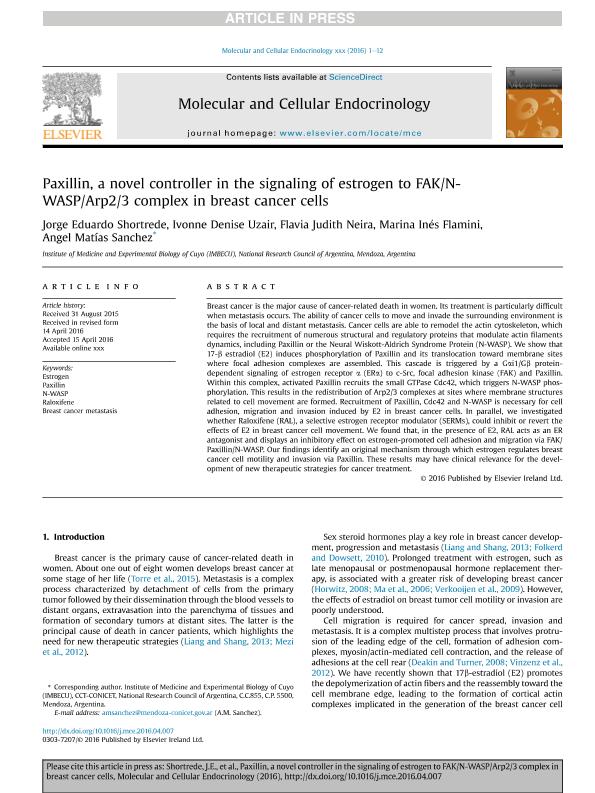Artículo
Paxillin, a novel controller in the signaling of estrogen to FAK/N-WASP/Arp2/3 complex in breast cancer cells
Shortrede, Jorge Eduardo; Uzair, Ivonne Denise ; Neira, Flavia Judith
; Neira, Flavia Judith ; Flamini, Marina Ines
; Flamini, Marina Ines ; Sanchez, Angel Matias
; Sanchez, Angel Matias
 ; Neira, Flavia Judith
; Neira, Flavia Judith ; Flamini, Marina Ines
; Flamini, Marina Ines ; Sanchez, Angel Matias
; Sanchez, Angel Matias
Fecha de publicación:
15/07/2016
Editorial:
Elsevier Ireland
Revista:
Molecular and Cellular Endocrinology
ISSN:
0303-7207
Idioma:
Inglés
Tipo de recurso:
Artículo publicado
Clasificación temática:
Resumen
Breast cancer is the major cause of cancer-related death in women. Its treatment is particularly difficult when metastasis occurs. The ability of cancer cells to move and invade the surrounding environment is the basis of local and distant metastasis. Cancer cells are able to remodel the actin cytoskeleton, which requires the recruitment of numerous structural and regulatory proteins that modulate actin filaments dynamics, including Paxillin or the Neural Wiskott-Aldrich Syndrome Protein (N-WASP). We show that 17-β estradiol (E2) induces phosphorylation of Paxillin and its translocation toward membrane sites where focal adhesion complexes are assembled. This cascade is triggered by a Gαi1/Gβ protein-dependent signaling of estrogen receptor α (ERα) to c-Src, focal adhesion kinase (FAK) and Paxillin. Within this complex, activated Paxillin recruits the small GTPase Cdc42, which triggers N-WASP phosphorylation. This results in the redistribution of Arp2/3 complexes at sites where membrane structures related to cell movement are formed. Recruitment of Paxillin, Cdc42 and N-WASP is necessary for cell adhesion, migration and invasion induced by E2 in breast cancer cells. In parallel, we investigated whether Raloxifene (RAL), a selective estrogen receptor modulator (SERMs), could inhibit or revert the effects of E2 in breast cancer cell movement. We found that, in the presence of E2, RAL acts as an ER antagonist and displays an inhibitory effect on estrogen-promoted cell adhesion and migration via FAK/Paxillin/N-WASP. Our findings identify an original mechanism through which estrogen regulates breast cancer cell motility and invasion via Paxillin. These results may have clinical relevance for the development of new therapeutic strategies for cancer treatment.
Palabras clave:
Breast Cancer Metastasis
,
Estrogen
,
N-Wasp
,
Paxillin
,
Raloxifene
Archivos asociados
Licencia
Identificadores
Colecciones
Articulos(IMBECU)
Articulos de INST. DE MEDICINA Y BIO. EXP. DE CUYO
Articulos de INST. DE MEDICINA Y BIO. EXP. DE CUYO
Citación
Shortrede, Jorge Eduardo; Uzair, Ivonne Denise; Neira, Flavia Judith; Flamini, Marina Ines; Sanchez, Angel Matias; Paxillin, a novel controller in the signaling of estrogen to FAK/N-WASP/Arp2/3 complex in breast cancer cells; Elsevier Ireland; Molecular and Cellular Endocrinology; 430; 15-7-2016; 56-67
Compartir
Altmétricas



